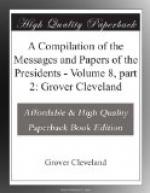If this construction be adopted, then each party has forever renounced the right of laying any duties on the vessels of the other coming from any foreign port, or more than 100 sols on those coming coastwise. Could this relinquishment be confined to the two contracting parties alone, the United States would be the gainers, for it is well known that a much greater number of American than of French vessels are employed in the commerce between the two countries; but the exemption once conceded by the one nation to the other becomes immediately the property of all others who are on the footing of the most favored nations. It is true that those others would be obliged to yield the same compensation, that is to say, to receive our vessels duty free. Whether we should gain or lose in the exchange of the measure with them is not easy to say.
Another consequence of this construction will be that the vessels of the most favored nations paying no duties will be on a better footing than those of natives which pay a moderate duty; consequently either the duty on these also must be given up or they will be supplanted by foreign vessels in our own ports.
The resource, then, of duty on vessels for the purposes either of revenue or regulation will be forever lost to both. It is hardly conceivable that either party looking forward to all these consequences would see their interest in them.
III. But if France persists in claiming this exemption, what is to be done? The claim, indeed, is couched in mild and friendly terms; but the idea leaks out that a refusal would authorize them to modify proportionally the favors granted by the same article to our navigation. Perhaps they may do what we should feel much more severely, they may turn their eyes to the favors granted us by their arrets of December 29, 1787, and December 7, 1788, which hang on their will alone, unconnected with the treaty. Those arrets, among other advantages, admit our whale oils to the exclusion of that of all other foreigners. And this monopoly procures a vent for seven-twelfths of the produce of that fishery, which experience has taught us could find no other market. Near two-thirds of the produce of our cod fisheries, too, have lately found a free vent in the colonies of France. This, indeed, has been an irregularity growing out of the anarchy reigning in those colonies. Yet the demands of the colonists, even of the Government party among them (if an auxiliary disposition can be excited by some marks of friendship and distinction on our part), may perhaps produce a constitutional concession to them to procure their provisions at the cheapest market; that is to say, at ours.




